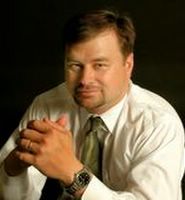Packet Article: Local Liberals vote for Kennedy
This article was originally published in the Orillia Packet and Times on October 2, 2006 - SK.
COLDWATER — Federal Liberal leadership candidate Gerard Kennedy won eight of a possible 14 delegate spots in the Simcoe-North federal Liberal Riding Association delegate selection Sunday.
Local voting saw the other leading leadership contenders: Stephane Dion, Michael Ignatieff, and Bob Rae, all held to just two delegates each. Other contenders, Ken Dryden, Joe Volpe, Scott Brison and Martha Hall Findlay, were shut out.
“The Kennedy camp is very satisfied with the results from Simcoe North,” said newly elected delegate and Kennedy Central Ontario Campaign Chair, Chris Ethier. Kennedy received just over 60 per cent of the ballots cast.
“The Kennedy camp clearly had the best organized team in Simcoe-North,” said previous Simcoe-North federal candidate Karen Graham, herself a Dion supporter.
She said the Kennedy and Dion camps were working together, and had agreed to support the other camp’s candidate, should their candidate be dropped from the ballot at the convention.
“So in fact we have elected 10 people who will support Dion if he is on the ballot at the end, or 10 for Kennedy if he is on the final ballot,” she said.
“Ignatieff has two delegate spots, which is more than I expected,” said Ignatieff supporter Mark Puddy, who ran, but did not get elected in the delegate election.
Of some 679 Simcoe-North federal members eligible to vote, just 103 actually voted. There were two spoiled ballots, with 101 ballots counting.
“I am disappointed with the turnout,” said riding President Dan Williams. “But to be realistic, people who vote are people who supported someone.”
Elected for the Kennedy camp were Carmine Cipolla, Chris Ethier, Gerry Hawes, Stephan Kramp, Scott MacLeod, Sarah Petrevan, Fred Smith and Donna Wakefield.
Elected for Stephane Dion were Paul Northcott and Alicia Smith.
Elected for Bob Rae were Janet and Kathryn Shaw.
Deborah A. Brown and an as yet to be named senior adult female were elected for the Ignatieff camp.
Voters chose from some 26 separate names on the ballot. The Kennedy camp was by far the largest, with 13 delegate candidates; followed by Stephane Dion and Joe Volpe, with five delegate candidates a piece. Bob Rae had three. Michael Ignatieff had two and Ken Dryden had one.
The delegates elected will be travelling to Montreal to participate in the Federal Liberal Leadership Convention being held Nov. 29 to Dec. 2.
Stewart Kiff will be travelling to the Montreal convention to report on the federal Liberal convention from an Orillia perspective. Kiff can be reached at stewart@solsticecanada.ca.
COLDWATER — Federal Liberal leadership candidate Gerard Kennedy won eight of a possible 14 delegate spots in the Simcoe-North federal Liberal Riding Association delegate selection Sunday.
Local voting saw the other leading leadership contenders: Stephane Dion, Michael Ignatieff, and Bob Rae, all held to just two delegates each. Other contenders, Ken Dryden, Joe Volpe, Scott Brison and Martha Hall Findlay, were shut out.
“The Kennedy camp is very satisfied with the results from Simcoe North,” said newly elected delegate and Kennedy Central Ontario Campaign Chair, Chris Ethier. Kennedy received just over 60 per cent of the ballots cast.
“The Kennedy camp clearly had the best organized team in Simcoe-North,” said previous Simcoe-North federal candidate Karen Graham, herself a Dion supporter.
She said the Kennedy and Dion camps were working together, and had agreed to support the other camp’s candidate, should their candidate be dropped from the ballot at the convention.
“So in fact we have elected 10 people who will support Dion if he is on the ballot at the end, or 10 for Kennedy if he is on the final ballot,” she said.
“Ignatieff has two delegate spots, which is more than I expected,” said Ignatieff supporter Mark Puddy, who ran, but did not get elected in the delegate election.
Of some 679 Simcoe-North federal members eligible to vote, just 103 actually voted. There were two spoiled ballots, with 101 ballots counting.
“I am disappointed with the turnout,” said riding President Dan Williams. “But to be realistic, people who vote are people who supported someone.”
Elected for the Kennedy camp were Carmine Cipolla, Chris Ethier, Gerry Hawes, Stephan Kramp, Scott MacLeod, Sarah Petrevan, Fred Smith and Donna Wakefield.
Elected for Stephane Dion were Paul Northcott and Alicia Smith.
Elected for Bob Rae were Janet and Kathryn Shaw.
Deborah A. Brown and an as yet to be named senior adult female were elected for the Ignatieff camp.
Voters chose from some 26 separate names on the ballot. The Kennedy camp was by far the largest, with 13 delegate candidates; followed by Stephane Dion and Joe Volpe, with five delegate candidates a piece. Bob Rae had three. Michael Ignatieff had two and Ken Dryden had one.
The delegates elected will be travelling to Montreal to participate in the Federal Liberal Leadership Convention being held Nov. 29 to Dec. 2.
Stewart Kiff will be travelling to the Montreal convention to report on the federal Liberal convention from an Orillia perspective. Kiff can be reached at stewart@solsticecanada.ca.

